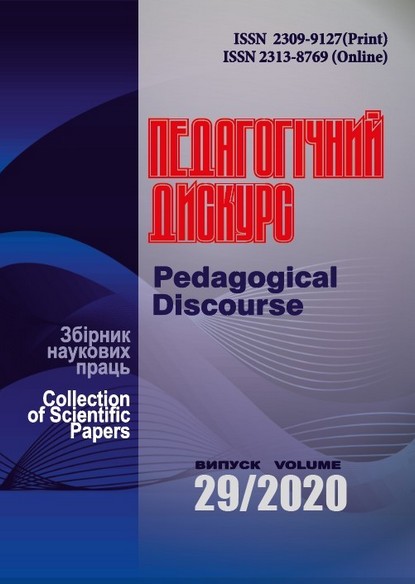Component Structure, Criteria of Formation of Professional Skills of the Future Teachers
Abstract
The article raises the problem of distinguishing the component structure, determining the criteria, levels of professional skills of the future teachers. To distinguish the component structure of the conformation of professional skills of the future teachers the functions of professional activity of modern teachers have been identified, which are implemented in a holistic structure of personal competence, namely perceptual, adaptive, coordination, reflexive functions. The functions of the future teacher’s ability to professional skills identified by us correspond to the professionally significant teacher’s personal qualities, which we consider as components of the teacher’s ability to professional skills, especially empathy (promotes the implementation of the perceptual function), self-control (the basis for the implementation of the adaptive function), organizational skills (promote the implementation of the coordination function) and reflection (the basis for the implementation of the reflexive function). The criteria for determining the level of formation of pedagogical skills have been identified: motivational (reflects the readiness to form professional pedagogical competence; the desire to obtain special knowledge and the formation of the necessary practical skills); cognitive (involves the possession of professionally significant knowledge: special, psychological, managerial, scientific and methodological, domain, technological, knowledge of the sociocultural context); functional (aimed at developing skills to master the technologies of professional functions); social (aimed at optimizing human resources). Three levels of formation of pedagogical skill of the future teachers have been described: sufficient, average, high.
Downloads
References
Voloshyna, O. V. (2014). Rol moralnykh vidnosyn mizh uchytelem i uchniamy v navchalno-vykhovnomu protsesi [The Role of Moral Adversaries between Teachers and Scholars in the Initial Process]. Naukovi zapysky Vinnytskoho derzhavnoho pedahohichnoho universytetu imeni Mykhaila Kotsiubynskoho – Scientific Notes of Vinnytsia Mykhailo Kotsiubynskyi State Pedagogical University, 41, 66–70 [in Ukrainian].
Hromkova, M. T. (2003). Psixologiya i pedagogika professional’noj deyatelnosti [Psychology and Pedagogy of Professional Activity]. Moscow: YuNITI-DANA [in Russian].
Dzhiga, N. D. (2009). Refleksiya i obrazovanie [Reflection and Education]. Retrieved from: http://www.hetoday.org/arxiv/VOS/7_2009/38_43.pdf [in Russian].
Efremov, O. Yu. (2010). Pedagogika [Pedagogy]. Saint-Petersburg: Piter [in Russian].
Kolominskij, Ya. L. (2010). Social’naya psyxologiya vzaimootnoshenij v maly’x gruppax [Social Psychology of Relationships in Small Groups]. Moscow: AST [in Russian].
Rodzhers, K. (1994). Vzgliad na psixoterapiyu. Stanovlenie cheloveka [A Look at Psychotherapy. Becoming a Man]. Moscow: Progress [in Russian].
Sardzhveladze, N. Y. (1989). Lichnost i ee vzaimodejstvie s socialnoj sredoj [Personality and Its Interaction with the Social Environment]. Tbilisi: Mecniereba [in Russian].
Xarlamov, Y. F. (2004). Pedagogika [Pedagogy]. Moscow: Gardariki [in Russian].

This work is licensed under a Creative Commons Attribution-NonCommercial-ShareAlike 4.0 International License.

















